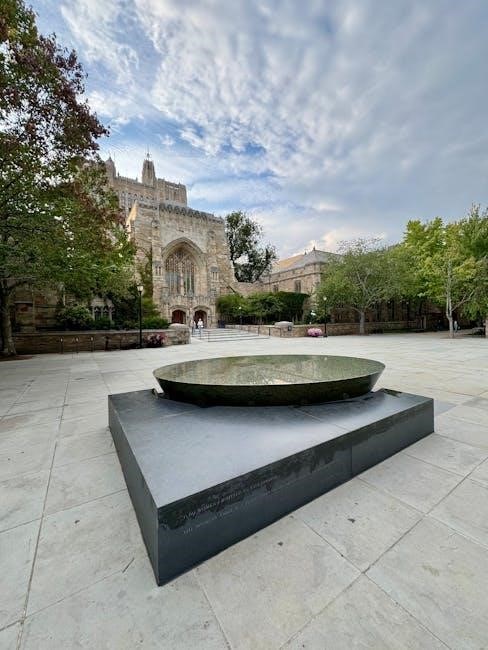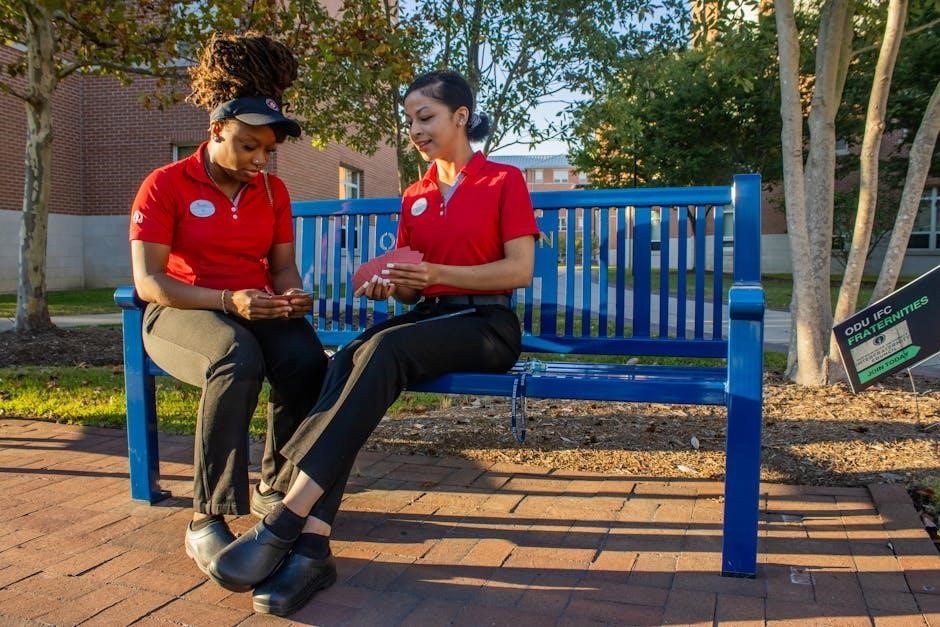
weber state university transfer guide
Welcome to Weber State University, a top-ranked institution offering accessible education and commuter-friendly programs. This guide helps transfer students navigate admissions, credits, and academic opportunities seamlessly.
Overview of Weber State University
Weber State University, located in Ogden, Utah, is a top-ranked institution offering accessible education and commuter-friendly programs. With a diverse student body of over 32,000, it provides high-quality degrees and support services. Known for its down-to-earth approach, WSU accommodates commuters and offers a range of academic programs, including master’s degrees. The university is recognized for its affordable tuition and commitment to student success, making it a top choice for transfer students seeking a seamless transition and excellent educational opportunities.
Importance of a Transfer Guide
A transfer guide is essential for ensuring a smooth transition to Weber State University. It provides clarity on credit transfer policies, degree requirements, and the admissions process. By understanding how credits align with WSU programs, students can avoid unnecessary coursework and stay on track for graduation. A transfer guide also helps students make informed decisions about course selection and academic pathways, ensuring their prior education is maximized and their transition to WSU is seamless and stress-free.

Transfer Admissions Process
Transfer admissions at Weber State University involve a structured process to ensure a smooth transition. Students must meet eligibility criteria, submit applications, and provide necessary documents. The process is designed to evaluate academic history and align credits with WSU programs, ensuring a seamless integration for transfer students.
Eligibility Requirements for Transfer Students
Transfer students must meet specific eligibility criteria to enroll at Weber State University. A minimum GPA of 2.0 is required for admission, along with completion of at least 24 transferable credits. Official transcripts from all previous institutions are mandatory. Students with fewer than 24 credits must also meet freshman admission requirements. Additionally, some programs may have higher GPA standards or prerequisite courses. Meeting these criteria ensures a smooth transition and academic readiness at Weber State University.
Application Process and Deadlines
The transfer application process at Weber State University is straightforward. Submit the online application, pay the fee, and upload required documents. Deadlines vary by semester: July 1 for Fall, December 1 for Spring, and April 1 for Summer. After submission, students receive a Wildcat ID to track their status online. International students should allow extra time for processing. Applications are reviewed on a rolling basis, with most decisions made within 2-4 weeks. Apply early to ensure timely processing and avoid delays.
Required Documents for Transfer Applications
The transfer application requires official transcripts from all previously attended colleges or universities. Immunization records must also be submitted. ACT or SAT scores are needed if transferring fewer than 30 credits. Placement tests may be required for math or English courses. International students must provide TOEFL or IELTS scores and visa documentation. Additional documents, such as a SEVIS transfer form, may be required for F-1 visa holders. Submit all materials by the application deadline to ensure timely processing.

Transfer Credit Evaluation
Weber State evaluates transfer credits based on articulation agreements and course equivalency, ensuring a smooth transition and applying relevant credits to degree requirements.
How Credits Transfer to Weber State University
Transfer credits to Weber State University are evaluated based on articulation agreements and course equivalency. Credits from regionally accredited institutions are generally accepted, with a minimum GPA requirement for applicability. Official transcripts are reviewed to determine how credits align with Weber State’s curriculum. General education courses and major-specific classes transfer seamlessly when equivalent. Students can avoid redundant coursework by ensuring their previous credits match Weber State’s requirements. Meeting with advisors helps create a personalized plan for credit application.
Maximum Transfer Credits Allowed
Weber State University allows a maximum of 75 transfer credits for most undergraduate degree programs. For associate degree holders, up to 64 credits may be applied. The university requires students to complete at least 30 credits on campus to meet residency requirements. Transferring more than the allowed credits must be approved by the Registrar’s Office. This policy ensures students integrate fully into Weber State’s academic environment while maximizing the use of prior coursework.
Equivalency of Courses from Other Institutions
Weber State University evaluates courses from other institutions to determine equivalency. Transfer credits are accepted if they align with WSU’s curriculum. Courses must be from regionally accredited schools and passed with a minimum grade of C. The university provides an online transfer equivalency guide to help students review potential course matches. If unsure, students can submit syllabi for further evaluation. This process ensures seamless credit transfer and academic continuity for incoming students.

Financial Aid and Scholarships for Transfer Students
Weber State University offers various financial aid options and scholarships tailored for transfer students, helping them achieve their academic goals affordably. The university assists students in maximizing their aid packages through grants, loans, and institutional scholarships.
Types of Financial Aid Available
Weber State University provides transfer students with multiple financial aid options to fund their education. Federal grants, such as the Pell Grant and FSEOG, are available based on financial need. Institutional grants are awarded by the university to eligible students. Loans, including federal and private options, offer flexible repayment terms. Work-study programs provide part-time employment opportunities. Scholarships are also available for academic achievement or specific majors. Students are encouraged to explore these options and complete the FAFSA to determine eligibility.
Scholarships Specifically for Transfer Students
Weber State University offers scholarships tailored for transfer students to support their academic journey. The Transfer Student Scholarship is awarded based on academic merit and GPA. Additionally, the Phi Theta Kappa Scholarship is available for transfer students who are members of this honor society. Some scholarships are also major-specific or geared toward diversity and inclusion. Transfer students are encouraged to check WSU’s scholarship portal for deadlines and eligibility requirements to maximize their financial support opportunities.
How to Apply for Financial Aid as a Transfer Student
To apply for financial aid at Weber State University as a transfer student, complete the Free Application for Federal Student Aid (FAFSA) online. Include Weber State’s school code: 003259. Submit required documents like transcripts and tax information. Check deadlines to ensure timely processing. Review and accept your award offer via the university’s financial aid portal. Complete any additional steps, such as loan counseling, if required. Ensure your degree plan is finalized to apply aid correctly.

Housing and Campus Life
Weber State University offers a welcoming environment for transfer students, fostering a sense of community through convenient housing options and vibrant campus activities.
On-Campus Housing Options for Transfer Students
Weber State University provides various on-campus housing options tailored to transfer students, ensuring a smooth transition to university life. Residence halls and apartment-style accommodations offer convenience and community. Transfer students can choose from shared or private spaces, with amenities like Wi-Fi, study areas, and proximity to dining halls. Living on campus fosters connections and easy access to academic and social resources. Apply early to secure a spot, as housing fills quickly. On-campus living enhances the overall college experience.
Off-Campus Housing Alternatives
Weber State University offers off-campus housing alternatives for transfer students seeking flexibility and independence. Options include apartments, shared houses, and private rentals near the Ogden campus. These choices provide affordability and proximity to campus, with many properties within walking distance or a short drive. The university’s housing office can assist with finding off-campus options, ensuring a smooth transition. Transfer students often appreciate the freedom and convenience of living off-campus while still engaging in campus life and academic activities.
Campus Resources and Facilities Available to Transfer Students
Weber State University provides a variety of campus resources tailored to support transfer students. The Ellen Eccles Lee Library offers extensive study materials and quiet spaces, while the Student Union Building serves as a hub for socializing and dining. Academic support includes tutoring centers and advising services. Transfer students also have access to state-of-the-art fitness facilities, computer labs, and career services. These resources ensure a smooth transition and foster academic and personal success for transfer students navigating their new environment.

Academic Programs and Majors
Weber State University offers over 200 academic programs, including associate, bachelor’s, and graduate degrees. Transfer students can choose from a variety of flexible and affordable options.
Popular Majors for Transfer Students
Weber State University’s most popular majors among transfer students include business administration, health sciences, and education. These programs are renowned for their strong reputations, hands-on learning opportunities, and high job placement rates. Transfer students often choose these fields due to their alignment with career goals and the university’s flexible credit transfer process. Additionally, majors like criminal justice, nursing, and computer science are also in demand, offering students a seamless transition and academic support tailored to their needs.
Unique Academic Opportunities at Weber State University
Weber State University offers unique academic opportunities, including its renowned STEM programs and the Weber State Downtown campus. The university provides hands-on learning through internships, research projects, and community partnerships. Transfer students can benefit from the Honors Program, study abroad initiatives, and interdisciplinary courses. Additionally, Weber State’s commitment to experiential learning ensures students gain practical skills, preparing them for successful careers in their chosen fields.
Advising and Academic Support for Transfer Students
Weber State University provides dedicated advising and academic support tailored for transfer students. The Transfer Student Center offers personalized guidance to ensure a smooth transition. Academic advisors help create degree plans, while tutoring and mentorship programs enhance academic success. Transfer students also benefit from workshops on time management and academic strategies. Regular check-ins with advisors ensure students stay on track to meet their graduation goals;

Stay on Track for Graduation
Weber State University helps transfer students stay on track with degree plans, regular check-ins, and progress-tracking tools to ensure timely graduation and academic success.
Creating a Degree Plan as a Transfer Student
Transfer students at Weber State University can create a personalized degree plan with the help of academic advisors. This plan outlines required courses, transferred credits, and remaining coursework needed for graduation. By aligning transferred credits with WSU’s degree requirements, students ensure a smooth transition. Regular reviews of the degree plan with advisors help track progress and make necessary adjustments. This collaborative process ensures transfer students stay on track to graduate efficiently and meet their academic goals.
Meeting with Academic Advisors
Meeting with academic advisors is crucial for transfer students to ensure a smooth transition. Advisors help interpret transfer credits, outline remaining degree requirements, and create a tailored academic plan. Regular meetings ensure students stay on track, avoid unnecessary courses, and graduate on time. Transfer students should prepare for these meetings by reviewing their transcripts and understanding their academic goals. This collaboration ensures a personalized path to degree completion at Weber State University.
Tracking Progress Toward Graduation
Tracking progress toward graduation is essential for transfer students to stay aligned with their academic goals. Weber State University provides tools like Degree Works to monitor completed credits and remaining requirements. Regularly reviewing degree audits ensures students stay on track, avoid excess credits, and graduate on time. Transfer students should familiarize themselves with these resources to maintain visibility of their academic journey and make informed decisions about course selection and degree completion.

Success Stories of Transfer Students
Weber State University celebrates numerous transfer student success stories, showcasing alumni who achieved academic and career excellence. Notable graduates highlight the university’s supportive environment and resources.
Alumni Testimonials and Experiences
Transfer alumni praise Weber State University for its seamless transition process and supportive community. Many highlight the university’s academic support and resources as key to their success. Graduates often share stories of how Weber State’s programs and faculty helped them excel in their careers. These testimonials underscore the positive impact of the university’s transfer-friendly environment, emphasizing how it fosters growth and achievement for students from diverse academic backgrounds.
Success Rates of Transfer Students at Weber State University
Weber State University boasts strong success rates for transfer students, with high retention and graduation rates compared to national averages. Over 70% of transfer students graduate within two years, reflecting the university’s commitment to academic support. The institution’s focus on tailored advising and seamless credit transfers contributes to these positive outcomes, ensuring transfer students thrive and achieve their academic goals effectively.
Notable Achievements by Transfer Alumni
Transfer alumni from Weber State University have achieved remarkable success in various fields. Many have excelled in healthcare, technology, and education, earning advanced degrees and securing leadership roles. Some have received awards for innovation and community service, while others have started successful businesses. These accomplishments highlight the strong foundation and opportunities provided by Weber State, enabling transfer students to thrive and make meaningful contributions in their professional and personal lives.
Applying to Weber State University
Applying to Weber State University is a straightforward process. Submit your online application, transcripts, and test scores by the deadline. Admissions counselors are available to assist.
Step-by-Step Application Guide for Transfer Students
Complete the online application on Weber State’s website. Submit official transcripts from all previous institutions. Include test scores if required. Pay the application fee or request a waiver. Ensure all documents are sent by the deadline. Track your application status through the portal. Contact admissions counselors for assistance. Verify receipt of materials and await an admission decision. Once accepted, review next steps for enrollment, including orientation and course registration.
Common Application Mistakes to Avoid

Avoid missing deadlines by submitting materials early. Ensure all transcripts and documents are complete and accurate. Double-check the application for errors before submission. Verify eligibility requirements beforehand. Do not assume credits will automatically transfer without evaluation. Avoid waiting until the last minute to apply, as this can delay processing. Ensure test scores, if required, are sent directly from testing agencies. Lastly, confirm that all materials are received by the admissions office to prevent application delays.
What to Expect After Submitting Your Application
After submitting your application, you will receive a confirmation email. Your application will be reviewed by the admissions committee, which may take several weeks. Ensure all required documents, such as transcripts, are received. Once your application is complete, you will be notified of the admission decision. If admitted, you will receive instructions on next steps, including orientation and course registration. Stay informed through your student portal and be prepared to complete any additional steps to finalize your enrollment.

and Final Tips
Congratulations on completing the Weber State University Transfer Guide! Review your checklist, stay proactive, and remain positive. Utilize campus resources and stay connected for a smooth transition.
Final Checklist for Transfer Students
Ensure a seamless transition by completing these essential steps: confirm admission status, meet with academic advisors, review transfer credits, secure housing, complete orientation, finalize financial aid, and stay updated on deadlines. Organize required documents, update contact information, and connect with campus resources. Regularly check your university email and portal for important updates. Stay proactive, seek support when needed, and maintain open communication with the admissions and advising teams to ensure a smooth start at Weber State University.
Additional Resources for a Smooth Transition
To ensure a smooth transition, transfer students can utilize Weber State University’s extensive support network. The Academic Support Center offers tutoring and study resources, while the Financial Aid Office provides guidance on scholarships and grants. The Transfer Student Center hosts workshops and events tailored to transfer needs. Additionally, the university’s Online Portal offers access to course schedules, degree plans, and campus resources. Joining student clubs and attending orientation programs can also foster connection and success.